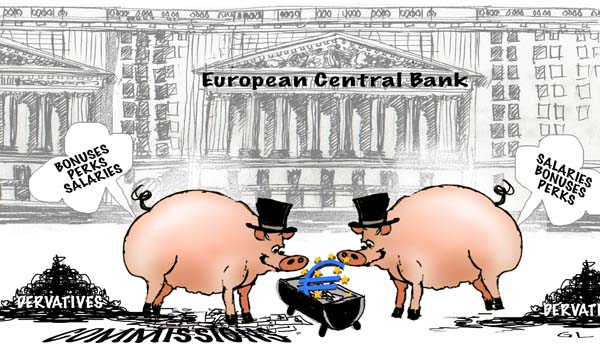Search
Recent comments
- crummy....
7 hours 48 min ago - RC into A....
9 hours 41 min ago - destabilising....
10 hours 44 min ago - lowe blow....
11 hours 16 min ago - names....
11 hours 53 min ago - sad sy....
12 hours 19 min ago - terrible pollies....
12 hours 29 min ago - illegal....
13 hours 40 min ago - sinister....
16 hours 2 min ago - war council.....
1 day 1 hour ago
Democracy Links
Member's Off-site Blogs
like pigs in mud...

Banks have gobbled up nearly 490 billion euros ($635 billion) in three-year, cut-price loans from the European Central Bank, easing immediate fears of a credit crunch but leaving unresolved how much will flow to needy eurozone economies.
Following a string of failed attempts by eurozone leaders to thwart market attacks on the bloc's weaker members, hopes of crisis relief before year's end had been pinned on a massive uptake of the ECB's ultra-long and ultra-cheap loans.
The near half-trillion euro take-up of ECB funds represented the most the bank has ever pumped into the financial system and exceeded almost all forecasts. A total of 523 banks borrowed, with demand way above the 310 billion euros expected by traders.
"The take-up was massive ... much higher than the expected 300 billion euros. Liquidity on the banking system has now increased considerably," said Annalisa Piazza at Newedge Strategy.
http://www.abc.net.au/news/2011-12-22/banks-gorge-on-unlimited-euro-loans/3743126
- By Gus Leonisky at 22 Dec 2011 - 10:34am
- Gus Leonisky's blog
- Login or register to post comments
christmas gift for banks...
By DAVID JOLLY AND JACK EWINGPARIS — After more than a year of frustrating and mostly fruitless summit meetings of European political leaders, the European Central Bank appears to have found a more promising way to ease the euro zone crisis: give money to banks at bargain-basement rates.
The E.C.B., making an offer too good for Europe’s banks to refuse, reported Wednesday that it had doled out almost half a trillion euros in low-cost three-year loans to keep credit flowing at a time when European banks are finding it all but impossible to finance their operations through normal market channels.
The lending reduces the “risk of a Lehman-type situation, where banks go into the new year facing a wave of refinancing and are unable to access the market,” said Jacques Cailloux, the chief euro zone economist at Royal Bank of Scotland.
But it is probably only a temporary solution. By acting essentially as a lender of last resort to the European financial system, the E.C.B. managed mainly to buy time for Europe to work out its longer-range problems of excessive debts, lagging economic competitiveness and limited fiscal unity.
The E.C.B. allocated €489.2 billion, or $639 billion, to 523 institutions, well above the roughly €300 billion estimate of analysts polled by Reuters and Bloomberg News.
Even as Mario Draghi, the new E.C.B. president, continues to resist calls to stand directly behind sovereign debtors without limit, the scale of the liquidity injection suggested that the E.C.B. is prepared to indirectly support them through the banking system.
Carl B. Weinberg, chief economist at High Frequency Economics and a self-described bear on the European outlook, said he was stunned by the size of the monetary operation, saying it suggested Mr. Draghi had “shown a path toward averting catastrophic collapse in Europe.”
http://www.nytimes.com/2011/12/22/business/global/demand-for-ecb-loans-surpasses-expectations.html?hp=&pagewanted=print